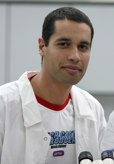Goals
Relevant Academics for In-Demand Careers
The biotechnology program features courses on topics at the forefront of the field. Students are taught the theory of biotechnology combined with hands-on experience to ensure that they receive skills that will support them as technologies change. Examples of courses in in-demand subspecialties of biotechnology include:
- Pharmacogenetics
Recent years have seen the rapid development of pharmacogenetics, a dynamic science which explores the ways in which human genetic variations can impact individuals' unique responses to certain medications. This science aims to explain differences in treatment efficacy for serious diseases such as cancer, neurological conditions, auto-immune disorders and more. Advances in the field will enable physicians to better custom tailor medical care to each individual patient's specific needs and responses, with the overall result of improved outcomes and quicker recovery times.
- Drug Development
Drug development is considered the leading research field in the pharmacology industry. Many resources are invested in producing new drugs for treatment of cancer, AIDS, Multiple Sclerosis, Alzheimer's Disease and others, while many patents are in their developmental stages. Drug development research has the potential to vastly benefit humanity while simultaneously encouraging and supporting industry success and development.
Other employment opportunities for biotechnology graduates include:
1. Biotechnology and Pharmaceutical Industries
- Genetic sequence analysis
- Research and analysis of genetic structures
- Development of tools for genetic analysis
- Development and maintenance of genetic databases
- Development of new molecular structures through protein modeling and design
- Modification of existing proteins
- Development of new antibiotics and other drugs
- Analysis of the effect of genetic variability on drug activity
- Development of new treatments based on information derived from the human genome
- Gene therapy
2. Hospitals, Universities and Research Institutions
- Diagnosis of genetic or molecular diseases
- Assistance in clinical research related to genetic and molecular diseases
- Academic research
3. Agriculture and Food Industries
- Development of genetically engineered plants
- Plant protection through genetic engineering
- Plant enhancement and improvement of animal characteristics
- Development and applications of products derived from algae.
Program Description
The program consists of six academic semesters taken over the course of three years. Students attend between 25 to 30 hours of lectures and exercises per week.
In total, the program consists of 140 academic credits.
In addition to traditional classroom lectures, students also engage in exciting real-world projects in the field. around the world. For example, the College's biotechnology students are currently participating in an EU-funded research effort called Project Bio-Explore, a large-scale biotechnology research study examining possible therapeutic uses for local plants. The project is being conducted in cooperation with researchers from the United States, Spain, Greece and the Palestinian Authority. For more information in Hebrew click here.
Admissions Requirements
Applicants must submit records from high school matriculation and psychometric examinations. In addition, applicants will be interviewed by the admission committee. For more information in Hebrew click here.
Faculty and Staff
Contact Us
Department Coordinator
nira@jmc.ac.il
+972 2 6291917








